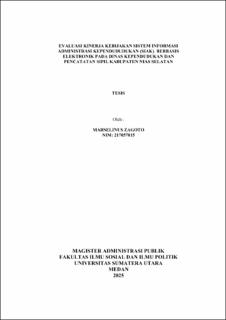| dc.description.abstract | This study aims to evaluate the performance of the implementation of the Population Administration Information System (SIAK) policy at the Department of Population and Civil Registration of South Nias Regency. The evaluation is based on six criteria developed by William N. Dunn, namely: effectiveness, efficiency, adequacy, equity, responsiveness, and appropriateness. A descriptive qualitative approach was employed, utilizing data triangulation through interviews, observations, and documentation. Informants were selected through purposive sampling, consisting of Disdukcapil officials and service users from the community.
The results show that the implementation of SIAK has improved service effectiveness, particularly in accelerating the recording and printing processes of civil documents. Efficiency has also increased in terms of time and cost, although challenges such as limited network infrastructure and low digital literacy especially in remote areas-persist. The adequacy and equity of services have improved, though community participation in reporting vital events remains limited. Institutional responsiveness has increased, yet the utilization of digital complaint channels and inter-agency coordination still requires enhancement. Overall, the SIAK policy is considered appropriate as it aligns with national regulations and supports the improvement of population data quality.
To ensure the quality of the evaluation process, this study also incorporates a meta-evaluation based on the JCSEE (Joint Committee on Standards for Educational Evaluation) standards, which include utility, feasibility, propriety, and accuracy. The meta-evaluation results indicate that the primary evaluation process falls into the "Excellent" category, with the highest scores in propriety (81.3%) and accuracy (83.3%). | en_US |


